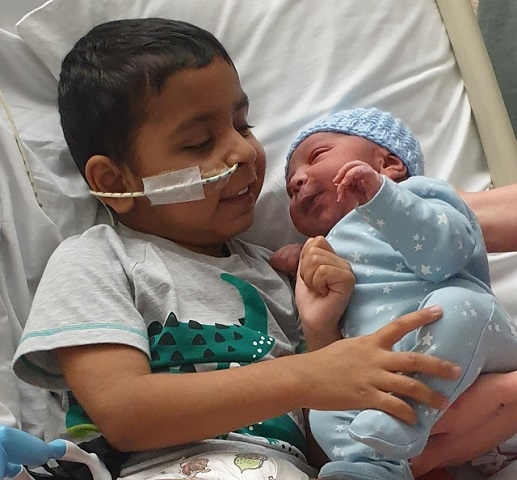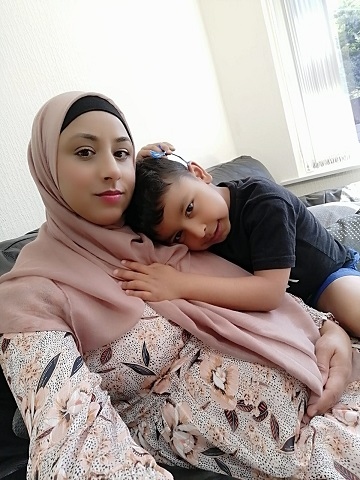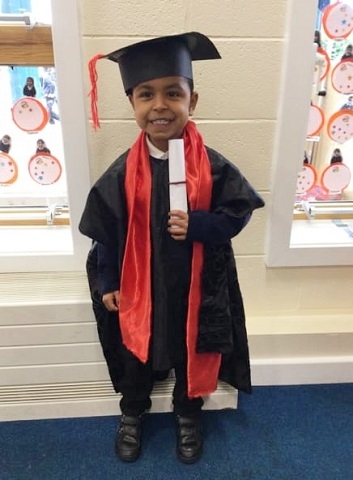Marland mum gave birth terrified her other son, 5, would die from brain cancer without her by his side
Date published: 06 June 2022

Photo: The Brain Tumour Charity
The heartbreaking bittersweet moment Saqib met his baby brother Atif just hours after he was born on 21 September 2021. Thirteen days later Saqib died.
In the space of just two weeks, Fauzia Ashraf, 32, of Marland, Rochdale, brought a new life into the world and lost another son to 'brutal' brain cancer, 10 weeks after his first headache.
The heartbroken mother has opened up about the death of her “shining star” five-year-old son, Saqib Ahmed, to help The Brain Tumour Charity raise awareness about the biggest cancer killer of children in the UK and support its HeadSmart campaign to highlight children’s brain tumour symptoms for earlier diagnosis.
At 32 weeks pregnant, Fauzia Ashraf was looking forward to completing her family with husband Mohsin Ahmed, 32, as they were about to welcome their third son and baby brother for Aqib, then seven, and Saqib, four, into the world.
Instead, they endured the anguish of saying goodbye to Saqib weeks after Fauzia gave birth to her third son.
In the space of just 10 weeks – from her “sweet, kind boy” having his first symptom – he died from a rare brain tumour on 4 October 2021, two weeks after his fifth birthday.
Heartbreakingly, as Fauzia was in labour with son Atif, now eight months old, she was “terrified” Saqib would die at another hospital without her being there.
“As I gave birth to my baby, my biggest fear was having to leave my five-year-old son on the children's cancer ward and him dying without his mummy by his side,” said Fauzia. “I was not in that room present for the new life I was bringing into the world.
“Instead of being excited about meeting my baby, all I could see was Saqib’s beautiful face as I prayed he wouldn’t die while I was in labour.
“With each contraction, I prayed that Saqib would live to see his brother and his pain would be eased.”
Now Fauzia is sharing her son’s story through The Brain Tumour Charity to help raise awareness about brain tumours – the biggest cancer killer of children and adults under 40 in the UK. She is backing The Charity’s HeadSmart campaign which highlights common symptoms of children’s brain tumours and aims to reduce average diagnosis times by supporting parents, the public and healthcare professionals to recognise the signs.
“We are driven to share Saqib’s story because the pain of losing a child is unnatural and unbearable,” said Fauzia, a history teacher in Prestwich.
Saqib means ‘shining star’ in Arabic and his grieving mother says it was the “perfect name” for him.
“He lit up our lives and brightened everyone’s day with his radiant smile,” she said. “His sweet nature touched the lives of everyone who knew him.”
The family’s nightmare started in the school summer holidays last year, after Saqib left the nursery class at Marland Hill Community Primary School, and was due to start reception that September.
Fauzia continued: “I was looking forward to having fun with Aqib and Saqib before the baby was born.
“On Saqib’s last day at nursery the teachers, who he adored, waved goodbye, and said, “see you in September.’
“Just days later, Saqib started having headaches. They started as sporadic five-minute bursts of pain every two or three days or nights – it was random.
“He was fine in-between, still swimming at the Swim Academy at Rochdale Leisure Centre bouncing on the trampoline and going to his karate lessons at the Dojo Karate Club in Rochdale.
“Now I know that when he told me, ‘Mummy, my head hurts,’ he didn’t have the vocabulary to say, ‘Mummy, I’m dying.’”

she was six months pregnant with his baby brother
Photo: The Brain Tumour Charity
A week after he started suffering headaches, Saqib was dribbling and a few days after that, he suddenly became frightened of using the stairs. Instead of leaping past Fauzia in his Spiderman costume, he would shuffle down on his bottom.
“The changes happened so rapidly and in that time I made contact six times with GPs,” said Fauzia.
“Due to Covid, it was hard to get a face-to-face appointment and even when I did get to see a GP in person, she just told me not to worry as children ‘didn’t know what headaches were.’
“One GP said it was a virus and another said Saqib’s headaches were caused by ear wax and prescribed olive oil drops.
“I felt fobbed off and unheard. They made me feel like the ‘crazy mum’ who was worried for no reason.”
Desperate to find out what was wrong with her son, when the GP referred him for blood tests, she chased up the appointment with the treatment centre herself and got an appointment that week. Nothing untoward was found.
Fauzia took Saqib to an optician who said he was short-sighted and needed glasses, but instinct told Fauzia that was not the case.
“Being pregnant, I was hesitant to go to the hospital myself in the pandemic but, deep down, I was crying for help,” she said.
“I knew my son didn’t have a virus, ear wax or needed glasses – my every instinct told me something was very wrong.”
On 13 August 2021, Fauzia was desperate for help when she made contact for the sixth time with a GP in three weeks.
“I’d always be respectful and composed but this time I refused to go home until he helped us. I told him, ‘I’m 35 weeks pregnant and I can’t cope,’” she said.
The GP rang Royal Oldham Hospital while Fauzia was in the room and relayed the three weeks’ events to them.
“The paediatrics said they wanted to see us urgently. Mohsin dropped us off there so I didn’t have to worry about parking,” said Fauzia.

Just weeks later he started suffering headaches and
died seven weeks after being diagnosed with a DIPG
Photo: The Brain Tumour Charity
“Saqib had a CT scan and several hours later, three doctors and a nurse came over to the bed and the senior doctor said, ‘I’m really sorry, it’s bad news… the scan shows a cancerous tumour in your son’s brain.’
“I couldn’t take it in. Saqib was singing and jumping on and off the bed. How could he have brain cancer? It had to be a mistake.
“I looked from face to face and they looked so sad and sorry. In that instant, I broke down and had to be helped from the room. I managed to phone my husband and dad.
“It was 10pm by the time Mohsin had settled Aqib at my parents; he came back and slept with Saqib and me at the hospital.”
Unbeknown to them, their son would never spend another night at home.
The following evening, they were transferred to Royal Manchester Children's Hospital, where Fauzia and Mohsin stayed with their son for seven weeks.

Photo: The Brain Tumour Charity
Saqib had a more detailed MRI scan and got the results the following day.
“I prayed that the doctors would be able to help him,” said Fauzia. “As we sat listening to our oncologist, he was so kind and supportive but I could sense he was building up to tell us bad news.
“He said that Saqib’s tumour was a Diffuse Intrinsic Pontine Glioma (DIPG), which was inoperable and incurable – no child in the world had ever survived it.
“In shock, I remember asking if he’d be able to start school in September as I’d already bought his uniform. Would he live until five? It was his birthday the next month. Until 10?
“I asked if he was sure it was cancer and surely they could operate. He said there may be an option for radiotherapy to give Saqib extra weeks to live but it depended on his health.
“I could not believe there was no hope for our little boy and that he’d been handed a death sentence.”
That day, Saqib’s tumour had a massive bleed, leaving him paralysed and unable to speak.
“He was confused and nodded and pointed at things to communicate with us,’ said Fauzia.
“In a matter of days, I had already started to lose him and I can’t remember what my little chatter box’s last words to me were.’
Fauzia struggled to tell Aqib his little brother was dying.
“We’d told him that Saqib had cancer and was very poorly,’ she said.
“But I couldn’t bring myself to tell him he was going to die – I couldn’t bear to say it out loud. When he asked me if Saqib would be going to school in September, I told him, ‘Doctors don’t think he will live that long.’”
Saqib was too ill to have radiotherapy and he was placed on end-of-life care.
“Earlier diagnosis wouldn’t have saved Saqib’s life but he may have been well enough to have radiotherapy and give him precious extra time with us and his baby brother,” said Fauzia.
The family’s life was “broken.”
“One son was dying, one son was unborn and our other son was staying with my parents,” said Fauzia. “Our life was unrecognisable.”
Over the next seven weeks, some days Saqib slept all the time, his Buzz Lightyear and Mr Incredible Toys always at his side; other days he managed to play with his pirate ship or watch his favourite Aladdin film.
“He was on medicines through a syringe driver in his leg and fed with milk through a tube in his nose,” said Fauzia.
“When he became agitated or was in extreme pain, he had needles injected into his legs.
“Just weeks before, he was a healthy, happy little boy, now we were caring for a severely disabled child. The progress of DIPG was aggressive, fast and relentless.
“The nurses couldn’t have done more to look after us and be there for us.”

Photo: The Brain Tumour Charity
Heavily pregnant Fauzia and Mohsin didn’t spend a single day away from Saqib.
“We promised he would always have Mummy or Daddy with him, our final act of love for our beautiful boy,” she said.
On Saqib’s fifth birthday - 19 September 2021 – the family had a “bittersweet” celebration around his bed.
“Saqib couldn’t play or eat his cake but the four of us just wanted to be together,” said Fauzia.
“I found myself praying he’d see his sixth birthday but I knew we were losing him.”
The next day, Fauzia was induced and gave birth to Atif on 21 September 2021.
“I was overdue but refused to be induced before Saqib’s birthday - I couldn't miss his last one,” said Fauzia.
Fauzia and Mohsin had special permission to take their newborn son up to the children’s cancer ward to meet Saqib.
“We should have been at home, not on a cancer ward but it still felt special to have all our boys together that night,” she said.
“I could see how happy Saqib was as he’d always wanted to be a big brother and he got to meet the baby he used to sing to in my tummy before his headaches started.”
Fauzia felt dreadfully torn between wanting to be with Saqib and her newborn so she slept in family accommodation while Mohsin stayed at hospital with their desperately ill son.
Just 13 days after his baby brother was born, Saqib’s condition deteriorated and he died on 4 October 2021.
“My little love left this world with his mummy and daddy at his side like we’d promised,” said Fauzia.
“He stopped breathing and we felt his heart stop beating.
“We lay with him for a few hours and I drank in every detail of his beautiful face with images reeling through my mind of how he used to laugh and joke and loved hugging and kissing me.
“I just couldn’t let go of his little hands.”
Devout Muslim Fauzia is grateful for the “incredible support” the family had from the hospital chaplains.
“The female Muslim chaplain, called Anika, was amazing. She helped me plan Saqib’s funeral and came to his burial on the same day he died, according to Muslim custom,” she said.

Photo: The Brain Tumour Charity
Nearly eight months on, Fauzia is struggling to adjust to a life without Saqib.
“Life is different and I am changed forever,” she said.
“I’m still in shock that within two weeks I gave birth to one child and lost another.
“I struggle to recognise the world and who I am now – I don’t know how I’m supposed to feel.”
While Fauzia draws comfort from her faith, she says that “no parent should lose a child.”
“I’ll never see Saqib start school, his first job or get married,” said Fauzia.
“I won’t see him grow up – he is forever five.
“No parent wants to be without their child but having my other two boys is what gets me out of bed in the morning.”
Saqib’s brothers have been “robbed” too.
“Aqib misses Saqib dreadfully – he’s got no one to play or squabble with,” said Fauzia.
“His baby brother won’t have the joy of knowing him, although we’ll tell him all about Saqib and he’ll always be part of our family.”
Fauzia says Saqib’s death has made the world a ‘scary place’.
“Our innocence has gone as the unthinkable has happened,” she said.
“Nothing can prepare you for receiving your child’s death certificate.”
Now Fauzia says that supporting The Brain Tumour Charity’s HeadSmart campaign in her son’s memory helps give her purpose.
“I give out the HeadSmart symptoms cards to family, friends and every parent I meet,” said Fauzia, who has also had support from Abbie’s Army DIPG charity and a Muslim bereavement service, Children of Jannah.
“I gave some to Atif’s health visitor and she has displayed them at the baby clinic.”
The grieving mother is “driven” to raise awareness to help save other families her heartache.
“If I can help save one parent the pain of losing a child, it’s worth it,’ said Fauzia.
“I ache for Saqib but I’ll always be proud to be his mum.
“Somehow I have to find a new way to live my life and he’ll be my inspiration – my shining star lighting the way.”

Photo: The Brain Tumour Charity
Alex Lochrane, The Brain Tumour Charity’s CEO, said: “The loss of a child is every parent’s darkest nightmare, and words cannot express our sorrow for Fauzia and Mohsin’s loss of their son, Saqib, just seven weeks after his diagnosis, but also our gratitude and admiration for their courage in sharing his story to raise vital awareness of Diffuse Intrinsic Pontine Glioma, and highlight our HeadSmart campaign.
“Brain tumours remain the leading cause of children’s cancer death in the UK and DIPGs, which are a rare and highly-aggressive form of brain tumours, have a particularly poor prognosis of less than a year on average.
“Radiotherapy is the current standard treatment for DIPGs with surgery usually impossible due to the difficulty of removing a diffuse tumour without damaging healthy tissue and chemotherapy drugs having been found to be ineffective in treating DIPGs.
“Progress for children diagnosed with DIPGs is desperately needed, which is why we are proud to have been co-funding the BIOMEDE clinical trial along with Cancer Research UK. It’s the first trial of its kind in DIPGs as biopsies are taken from children’s tumours to identify cancer’s molecular traits so tailored treatment can be offered.
“Our HeadSmart campaign to raise awareness about children’s brain tumour symptoms has two aims: to help save lives and reduce diagnosis times to lower the chance of long-term disabilities.
“A key part of that is to support parents, carers and healthcare professionals to be aware of possible warning signs of children’s brain tumour symptoms.
“Since the development and launch of HeadSmart, the average diagnosis time for children with brain tumours in the UK has been halved from 13 weeks to 6.5 weeks. We now want to further reduce that to four weeks or less in line with NHS targets.
“While brain tumours are relatively rare in children and young people, if you’re worried and your child’s symptom persists or they have more than one symptom, like Fauzia, we’d encourage you to trust your instincts – speak to your doctor and show them our HeadSmart symptoms card.
“Anyone affected by a brain tumour can also call our free support and information line on 0808 800 0004 or email support@thebraintumourcharity.org. We are here to listen, support and help with trusted information.”
Do you have a story for us?
Let us know by emailing news@rochdaleonline.co.uk
All contact will be treated in confidence.
Most Viewed News Stories
- 1Rochdale drug dealer jailed for 7 years despite attempting to flee
- 2Trio jailed for 20 years after shotgun fired at Rochdale house in broad daylight
- 3First-ever Workers’ Party councillors elected to Rochdale Borough Council; Labour retains overall...
- 4Ocean Colour Scene to play Rochdale Feel Good Festival
- 5First full Stalking Protection Order against a child in UK secured for family in Heywood
To contact the Rochdale Online news desk, email news@rochdaleonline.co.uk or visit our news submission page.
To get the latest news on your desktop or mobile, follow Rochdale Online on Twitter and Facebook.


